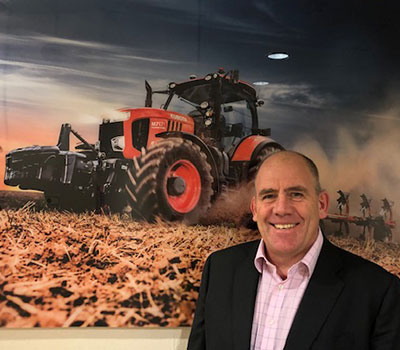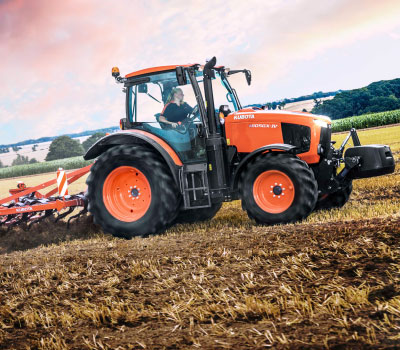The changes in farming technology from Kubota farming (interview)
Farm Diversity editor Victoria Galligan speaks to Kubota UK’s business development manager for agriculture Rob Edwards about the changes in farming technology which are improving efficiency, and the need for more education for both farmers and consumers when it comes to protecting the environment…
Kubota is a company which hails from Japan, where the brand goes back 140 years. Not only does the firm produce farming machinery, it also manufactures a ground care range as well as industrial engines and construction machinery.
Its motto is ‘For Earth, For Life’ and Rob says this is reflected in the way the company develops both its products and its support for farmers.
Rob says: “People need to eat but we also need to take care of our environment, and farming can do all of this. We have to believe in farming.
“At Kubota we believe in diversity with a big D – broader diversification which involves farming practices.
“It’s about maximising what you’ve got. If farmers rely on one particular crop they are completely reliant on that particular revenue stream.
“So if farmers want to broaden their practices, whether that’s by growing something new or by building property on their land, for example, we have the products they need.”
Filling the farming technology skills gap 
With all the new farming technology on the market, there comes a need for more training in modern methods of agriculture. Rob welcomes the Government’s recent investment in agricultural technology – where £22million in funding was pledged to 31 projects to develop greener, cleaner farm techniques – but says there is much more that needs to be done.
He says: “The investment which Kubota has put into the tech side of the business is long-term. It’s not immediate but we’re in a consumer-driven market.”
He says there is a skills gap in terms of using new farming technology – although thanks to apprenticeships like that run by Kubota UK alongside Coleg Cambria Llysfasi to train up machinery dealers, farmers are increasing their ability to keep up with the change in pace.
Rob explains: “We find that when new technology comes out, nowadays people are much faster to adopt it – even the top-end technology. Some new tech won’t succeed, that’s all part of research and development. But if we don’t try, we don’t progress.”
Data and knowledge transfer also play a part in improving skills and Rob encourages farmers to help improve the knowledge base of the industry by opening up more to others – he says many are already doing this to educate local peers but there is a need for more sharing of practice within the farming industry.
Using the environment as a guide
When it comes to diversifying your business, Rob is keen to stress that the ideal situation for farmers would be to farm every piece of land they have rather than develop it into a built environment or energy production site. However, he recognises many farmers don’t have a choice if they want their businesses to stay afloat.
Rob suggests looking at your environment carefully before deciding how to diversify – you might find some unexpected potential sources of revenue. For example, he says: “This weekend I got invited to a farm, just to look up at the stars!”
Stargazing for city dwellers has sparked numerous events and glamping projects in rural locations. Rob adds: “It’s a great example of how your environment opens up opportunities. And you can bring more revenue to your farm without changing the environment too much.
“I’d advise farmers to take stock of whatever resources they have and think about how they can make this better for business.”
Marketing and selling your product also has to be done properly – Rob points out that traditionally these activities would take place at the farmers’ market, but nowadays a new product or service needs to be marketed outside of the farming arena to attract the public’s interest and support.
He says: “Farmers have traditionally been great at growing things but they don’t necessarily know how to market and sell their product. Think about it; transferring from selling sheep to stargazing is a huge change!”
As the industry experiences value change and there is a huge pressure on profit margins, Rob says it’s useful to identify a niche when diversifying.
Understanding the national diet is a big part of this. Rob points out that the way veganism is currently being marketed is a good example of how food can become more than simply a product people buy. It can evolve into a health and lifestyle choice.
He says this can be applied to meat production too, as many consumers now want to know that animals have been reared well and make an effort to source their meat locally: “People need to be educated about what they are buying. People like good food, but they don’t necessarily understand food.”
Reducing food’s carbon footprint
Part of the environmental impact of food production, of course, is machinery and how much CO2 it produces. Rob assures us that everything is being done in this area to meet the Government’s 2050 zero-emissions target: “Anything with an engine has to meet emissions regulation – everyone’s machines is as green as possible.
“Farmers are utilising technology to improve what they do – for example via ISOBUS precision farming which can judge far better than the human eye, improving efficiency and saving time and fuel, and therefore reducing emissions.”
Rob says alternative and mixed fuels are being explored for farm machinery, such as hydro-carbons and electricity, but within a farmyard EV charging can currently only offer smaller machinery around three hours of use per day.
He adds: “There is a demand for the power requirement of machinery to change, especially from the Government, but unfortunately there is little guidance on how this should be done.”
Looking to the future, Rob says that Kubota UK will continue to work with its partners in education, engineering and farming to help ensure that farmers are at the forefront of making Britain a greener and cleaner place to live.
Kubota to attend National Ploughing  Championships
Championships
Kubota is delighted to attend and exhibit at this year’s National Ploughing Championships – the flagship event for the Irish farm machinery industry – taking place in co. Carlow, Ireland. From the 17th – 19th September, representatives from Kubota will be showcasing the very latest range of agricultural products.
Kubota will this year be showcasing its M4, M5, MGX and M7 series to prospective and existing Kubota customers. Both the new M4002 and MGX-IV tractors – which were launched in the spring of 2018 – will be on its stand.
Designed to make farmers’ work even quicker and more efficient, these machines have been built in line with Kubota’s usual high standards. With improved braking performance, an efficient hydraulic system and powerful engine, the new model in the MGX Series is a worthy heir to the previous range. The new MGX-IV introduces some enhancements to the original design of this range of tractors, with the hydraulic system making it suitable for any operation.
Investing in the appropriate machinery to support the farming community is a key objective for the team at Kubota UK and underlies why they are increasing their presence at the National Ploughing Championships this year – where they will be showcasing the entire range of agricultural machines available in the UK at Block 2, Row 15, Stand. on 337.
Come and see Kubota to find out more about the event, and the company's farming technology offering, or visit: kubota-eu.com
- Log in to post comments

